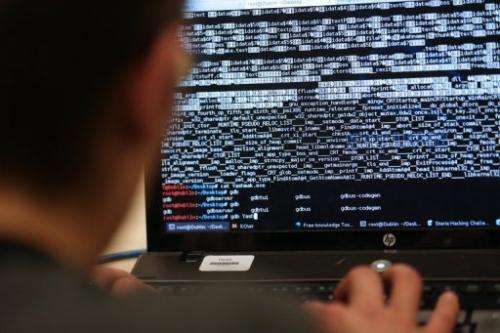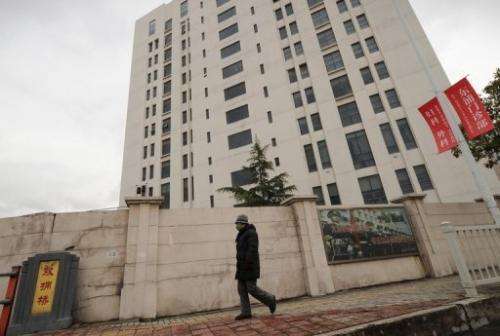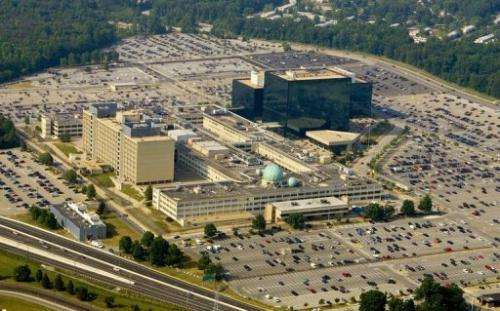A programmer attends a hacking challenge in Meudon, west of Paris, on March 16, 2013. The United States and China have aired concerns about hacking, which has emerged as a major irritant between the world's two largest economies.
The United States and China aired concerns on hacking, which has emerged as a major irritant between the world's two largest economies in the build up to annual talks this week.
Two days before they hold their main annual meetings, US and Chinese officials held a first session on cyber tensions, in Washington.
"This first meeting, we're hopeful, will enable the two sides to share perspectives on international laws and norms in cyberspace," State Department spokeswoman Jen Psaki told reporters.
Psaki voiced hope that the talks, which included a Pentagon official, would "set the tone" for future exchanges on cyber security.
Another State Department official, speaking on condition of anonymity, said that the United States had raised concerns about economic-related hacking.
The official said that both sides made "practical proposals" but declined to give further details.
The United States has accused China of waging a vast hacking campaign against America's government, military and companies, with a private study recently concluding that cyber-theft costs the world's biggest economy hundreds of billions of dollars a year.
China has hit back that it is also the victim of cyberattacks, charges that gained traction when the intelligence leaker Edward Snowden said US spies had hacked into the prestigious Tsinghua University, one of six centers that routes all of China's Internet traffic.
President Barack Obama has insisted there is a distinction between intelligence gathering, which he said all countries conduct, and the theft of trade secrets for commercial gain.
Hoping to ease the rift, US Secretary of State John Kerry and State Councilor Yang Jiechi, a key figure in setting China's foreign policy, in April announced the creation of the cyber dialogue.
A 12-storey building alleged in a report in February 2013 to be the home of a Chinese military-led hacking group in Shanghai. A National Intelligence Estimate from all 16 US spy agencies recently concluded that China ranked first in economic espionage against American companies, with France, Israel and Russia in second place.
Yang and Vice Premier Wang Yang will visit Washington for the Strategic and Economic Dialogue on Wednesday and Thursday, the main annual meeting between the two nations.
Kerry and Treasury Secretary Jacob Lew are the US chairs of the talks, although officials said that the former's schedule was still being determined after his wife, Teresa Heinz Kerry, was hospitalized for an apparent seizure.
In a sign of the importance that the United States draws to the relationship, Vice President Joe Biden will open the talks.
Biden led administration efforts to cultivate a relationship with Chinese President Xi Jinping, who took office in March and will likely be in charge of the rising power for the next decade.
Xi and Obama spent a weekend together last month at a retreat in California, with both sides saying they wanted the two leaders to develop a personal rapport.
Economic policy will figure prominently in this week's dialogue, with the United States pressing China to open its giant market further to foreign competition and to allow the value of its currency to rise from levels that critics say are kept artificially low to boost exports.
"From everything that we've been hearing, both in our private conversations as well as what we've seen in senior-level statements... there is a strong commitment to move forward with reform" by China's new leadership, a US official said.
"Of course, how they go about doing those reforms will matter greatly for us. How quickly they do it, I think, is still a question as well," she said.
The US National Security Agency (NSA) is shown in May 2006 in Fort Meade, Maryland. President Barack Obama is attempting to defuse the uproar over the National Security Agency's alleged eavesdropping on the European Union mission in Washington as well as embassies of other allies.
The United States and China will also look at ways to fight climate change—a priority for Kerry and an area on which Xi and Obama found common ground in their summit.
Ken Lieberthal, a senior fellow at the Brookings Institution who served as former president Bill Clinton's top adviser on Asia, said that the annual talks would look to build on "whatever momentum was developed" between Obama and Xi.
But Lieberthal said neither side expected "concrete deliverables," especially as the four main participants are all new in their jobs.
"Their predecessors have gotten to know each other well; these folks are early days," Lieberthal said.
Last year's Strategic and Economic Dialogue was overshadowed when leading activist Chen Guangcheng escaped house arrest for the safety of the US embassy days before Hillary Clinton, then the secretary of state, arrived in Beijing for the talks.
The United States and China eventually negotiated an agreement under which Chen, a blind self-taught lawyer who exposed forced abortions, was allowed to go to New York to study.
A US official said that Kerry "feels deeply" about human rights in China and would raise issues including the status of ethnic minorities.
© 2013 AFP

























